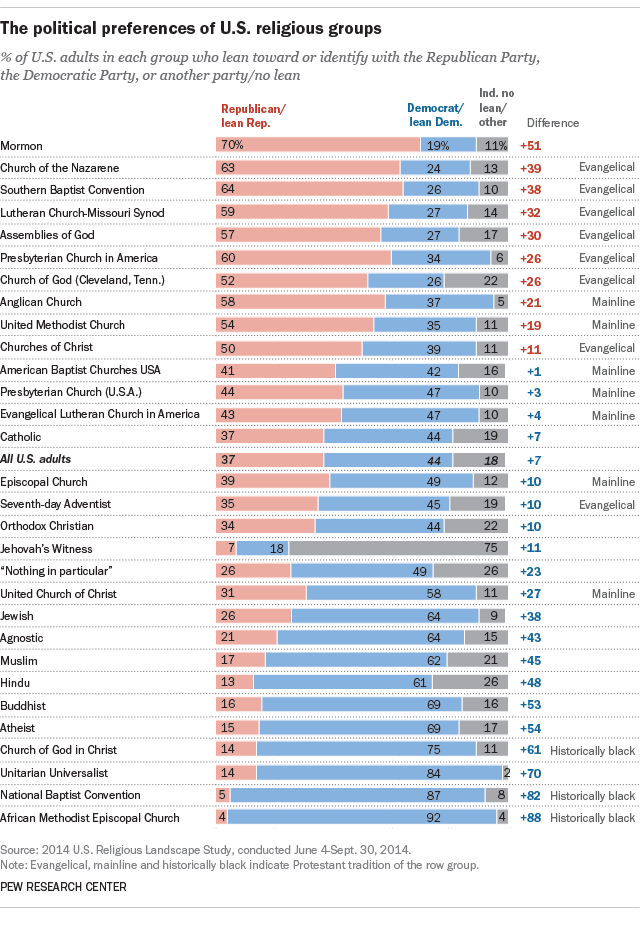 |
| Click to enlarge |
Rarely do I venture into American politics in these blog posts, but the increasingly right-wing political extremism of the Republican Party, as it cements its ties with Christian fundamentalism, becoming, in effect, the political wing of the Christian theocratic and anti-science movement, is worth commenting upon.
First a little test.
Supposing, just for the moment, that Jesus were to return, and was pretty much the way he is portrayed today in his social attitudes, given the following choices, which would he be most likely to go for?
- Would he:
- favour giving even more money to the rich?
- favour giving money to the poor?
- Would he:
- favour leaving the sick to fend for themselves as best they can?
- favour helping the sick to get better, regardless of their income?
- Would he:
- Would he:
- favour treating people differently depending on their race or ethnic origin?
- favour people being treated the same and given equal opportunities in life?
- Would he:
- favour building walls between people to keep the poor on one side from sharing with the rich on the other?
- favour pulling down the walls between people, building bridges and sharing wealth?
- Would he:
- favour more people having more guns?
- favour people putting down their arms and living in peace with one another?
- Would he:
- favour dropping more bombs on foreign countries?
- favour dropping fewer bombs and ending wars?
These choices more or less reflect the social, economic and foreign policies normally associated with the Republicans (a) and the Democrats (b), so, if their political affiliations are anything to go by, figures published by the Pew Research Centre from their 2014 US Religious Landscape Study show that most fundamentalist Christians would answer 'a' to each of the above whilst most religiously unaffiliated ('nones') or 'moderate Christians would answer 'b'. At least that is what they do when they vote according to party lines.
 To an outside observer such as me, both of US politics and of Christianity, these results might at first sight appear baffling. The more fundamentalist a Christian an American appears to be, the less like a 'Christian' they appear to behave, at least when compared to what most people would normally think of today as what Jesus would do. The figures are based on exit polls from 2012.
To an outside observer such as me, both of US politics and of Christianity, these results might at first sight appear baffling. The more fundamentalist a Christian an American appears to be, the less like a 'Christian' they appear to behave, at least when compared to what most people would normally think of today as what Jesus would do. The figures are based on exit polls from 2012.Most 'mainline' Protestants and the Catholics are generally evenly split and close to the average 'US adult' (i.e. average) voting pattern whereas all but a handful of evangelicals are strongly Republican. The exceptions to this general rule are the 'historically Black' churches, the Church of God in Christ, the National Baptist Convention and the African Methodist Episcopal Church which are strongly Democrat-supporting, almost certainly reflecting racial rather than religious voting patterns. What is noticeable too is how the non-Christian religious people all tend to be overwhelmingly supporters of the Democrats. The Jehovah's Witnesses stand out for their exceptionally high number of 'undecideds', however this is because their faith actually forbids them from voting.
So how did the US get into this situation where people's deeply held religious views can be used to persuade them to vote this way?
Voting Patterns, like church affiliation in the USA is partly hereditary, of course, in that children are likely to vote the same way as their parents and go to the same church. Notwithstanding the link between the 'historically Black' church affiliation and support for the Democrats, clearly, whatever idea of Christianity is being promulgated through the other evangelical churches, it is not the kind, caring, egalitarian primitive socialism normally associated with Jesus of the Bible. So, either these evangelicals have managed to find passages in the Bible that support their elitist, racist, dog-eat-dog and Devil take the hindmost, or they have been there all along and the image of 'gentle Jesus meek and mild' is an invention.
The answer to this conundrum is probably to be found in the fact that religious affiliation is more a cultural identity and a group affiliative process than a reflection of the actual political and social beliefs of the affiliate. Very few of those who self-identify as one or other denomination of Christian actually bother much with the underlying theology or the biblical bases of their particular cult, and very few actually ever read the Bible. To most Christians, the concept of what Jesus would do or say is actually a rather nebulous one and probably more along the lines of presupposing that, because you are a Christian, Jesus would agree with you. It is actually the pastor who tells you what to believe from the pulpit. If the pastor tells you that you should only vote for 'good God-fearing Republicans' because all the others hate Jesus and America, then that's good enough. You have a duty to defend Jesus and America by voting the right people in, and the right people are naturally White fundamentalist Christians.
God Bless America!
'via Blog this'


Thanks again for a soundly object view on the dangers that superstition and bigotry bring to bear on a world that by now ought to know so much better than that. Mr Donald Trump’s thin veil of faccism demonstrates how extreme Christian values have no place in world politics.
ReplyDelete